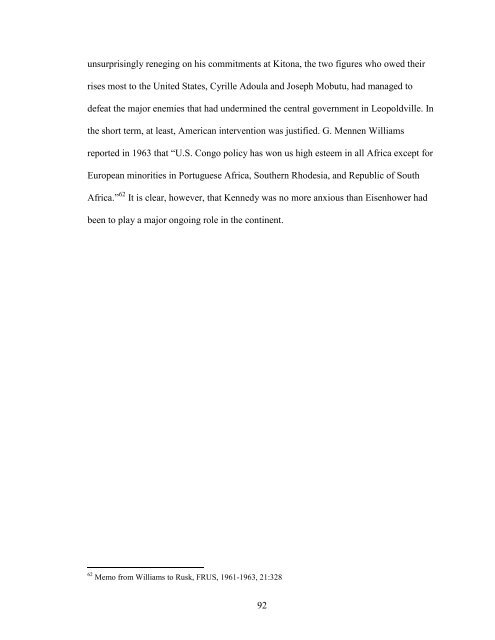A Familiar Frontier: The Kennedy Administration in the Congo ...
A Familiar Frontier: The Kennedy Administration in the Congo ... A Familiar Frontier: The Kennedy Administration in the Congo ...
especially by Union Miniére, which feared the destruction of its mining infrastructure. 58The British were pushed into support for this operation not only because of their desirefor continued good relations with the Americans, but also because Conor Cruise O’Brienhad resigned from the U.N. and publicly identified the U.K. for undermining previousoperations in September. Kennedy worked to reassure British Prime Minister HaroldMacmillan, while Macmillan hoped to cement his reputation against O’Brien’s chargesby giving bombs to the United Nations.Tshombe sent a telegram to Kennedy on December 14, asking Kennedy to“designate a suitable negotiator and to stop at once useless bloodshed.” 59 As a result,Kennedy dispatched Gullion to Ndola on December 18, where the American Ambassadorprevailed upon Tshombe to travel to Kitona to meet with Adoula. The Kitona agreementsaw Tshombe accept virtually all of Leopoldville’s conditions: Tshombe recognized thecentral government under Kasavubu as controlling a unified Congolese nation, agreed tosend deputies and senators to the national Parliament, and would place his military forcesat the disposal of Kasavubu. 60 George Ball sent a telegram to Kennedy calling it the“most encouraging event” in the Congo for months and noting that “Such a completecapitulation on Tshombe’s part goes far beyond our expectations.” 61Over the next few weeks, the United States would see even more encouragingsigns. Mobutu’s troops ended the secession of South Kasai on December 30, 1961,arresting Kalonji after an extended military campaign. In January 1962, the Congolesearmy defeated the forces in Stanleyville and arrested Gizenga. Although Tshombe was58 Kalb, The Congo Cables, 31459 Telegram from Ball to Gullion, FRUS, 1961-1963, 20:316, Note 160 Kalb, The Congo Cables, 32161 Qtd. in Kalb, The Congo Cables, 32191
unsurprisingly reneging on his commitments at Kitona, the two figures who owed theirrises most to the United States, Cyrille Adoula and Joseph Mobutu, had managed todefeat the major enemies that had undermined the central government in Leopoldville. Inthe short term, at least, American intervention was justified. G. Mennen Williamsreported in 1963 that “U.S. Congo policy has won us high esteem in all Africa except forEuropean minorities in Portuguese Africa, Southern Rhodesia, and Republic of SouthAfrica.” 62 It is clear, however, that Kennedy was no more anxious than Eisenhower hadbeen to play a major ongoing role in the continent.62 Memo from Williams to Rusk, FRUS, 1961-1963, 21:32892
- Page 44 and 45: Chapter Two:LEOPOLDVILLEEvents in t
- Page 46 and 47: assessment is valid, but it had lit
- Page 48 and 49: damage to his reputation among Afri
- Page 50 and 51: U.S. Ambassador Clare Timberlake su
- Page 52 and 53: would not respond any better to a n
- Page 54 and 55: about a greater degree of Congolese
- Page 56 and 57: will place yet another strain on NA
- Page 58 and 59: Once again, however, State Departme
- Page 60 and 61: overstepped their influence by tryi
- Page 62 and 63: ecommends that we permit the presen
- Page 64 and 65: States would only accept the best o
- Page 66 and 67: government was “as good as we cou
- Page 68 and 69: he wants Katanga to stay in Congo a
- Page 70 and 71: Chapter Three:ELISABETHVILLEThe Con
- Page 72 and 73: stability in Katanga, and in neighb
- Page 74 and 75: eminder of the low priority that Ei
- Page 76 and 77: gentle and realistic tack with the
- Page 78 and 79: without too much damage in Europe.
- Page 80 and 81: also warned the State Department ab
- Page 82 and 83: military action from turning into a
- Page 84 and 85: The events of August 1960 impressed
- Page 86 and 87: pointed out he had taken major risk
- Page 88 and 89: announced to the press that “this
- Page 90 and 91: evidence for such an outcome. On th
- Page 92 and 93: after the cease-fire, leading to th
- Page 96 and 97: ConclusionEvents in the Congo turne
- Page 98 and 99: Congo crisis began well before Amer
- Page 100 and 101: BibliographyHoskyns, Catherine. The
unsurpris<strong>in</strong>gly reneg<strong>in</strong>g on his commitments at Kitona, <strong>the</strong> two figures who owed <strong>the</strong>irrises most to <strong>the</strong> United States, Cyrille Adoula and Joseph Mobutu, had managed todefeat <strong>the</strong> major enemies that had underm<strong>in</strong>ed <strong>the</strong> central government <strong>in</strong> Leopoldville. In<strong>the</strong> short term, at least, American <strong>in</strong>tervention was justified. G. Mennen Williamsreported <strong>in</strong> 1963 that “U.S. <strong>Congo</strong> policy has won us high esteem <strong>in</strong> all Africa except forEuropean m<strong>in</strong>orities <strong>in</strong> Portuguese Africa, Sou<strong>the</strong>rn Rhodesia, and Republic of SouthAfrica.” 62 It is clear, however, that <strong>Kennedy</strong> was no more anxious than Eisenhower hadbeen to play a major ongo<strong>in</strong>g role <strong>in</strong> <strong>the</strong> cont<strong>in</strong>ent.62 Memo from Williams to Rusk, FRUS, 1961-1963, 21:32892



